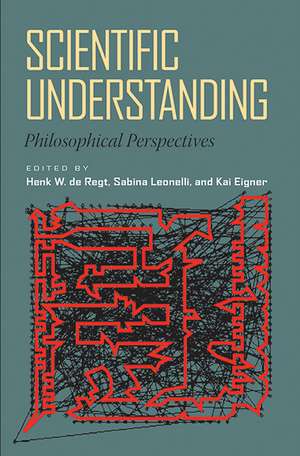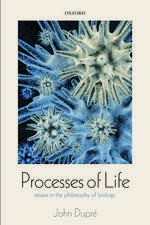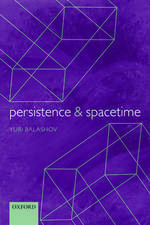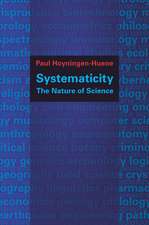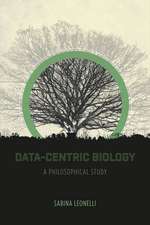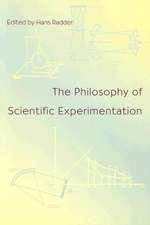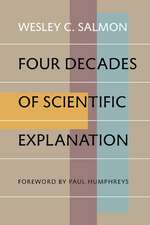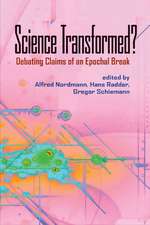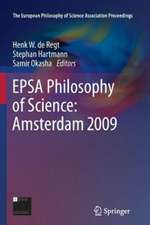Scientific Understanding: Philosophical Perspectives
Editat de Henk W. de Regt, Sabina Leonelli, Kai Eigneren Limba Engleză Paperback – 24 sep 2013
To most scientists, and to those interested in the sciences, understanding is the ultimate aim of scientific endeavor. In spite of this, understanding, and how it is achieved, has received little attention in recent philosophy of science. Scientific Understanding seeks to reverse this trend by providing original and in-depth accounts of the concept of understanding and its essential role in the scientific process. To this end, the chapters in this volume explore and develop three key topics: understanding and explanation, understanding and models, and understanding in scientific practice.
Earlier philosophers, such as Carl Hempel, dismissed understanding as subjective and pragmatic. They believed that the essence of science was to be found in scientific theories and explanations. In Scientific Understanding, the contributors maintain that we must also consider the relation between explanations and the scientists who construct and use them. They focus on understanding as the cognitive state that is a goal of explanation and on the understanding of theories and models as a means to this end.
The chapters in this book highlight the multifaceted nature of the process of scientific research. The contributors examine current uses of theory, models, simulations, and experiments to evaluate the degree to which these elements contribute to understanding. Their analyses pay due attention to the roles of intelligibility, tacit knowledge, and feelings of understanding. Furthermore, they investigate how understanding is obtained within diverse scientific disciplines and examine how the acquisition of understanding depends on specific contexts, the objects of study, and the stated aims of research.
Earlier philosophers, such as Carl Hempel, dismissed understanding as subjective and pragmatic. They believed that the essence of science was to be found in scientific theories and explanations. In Scientific Understanding, the contributors maintain that we must also consider the relation between explanations and the scientists who construct and use them. They focus on understanding as the cognitive state that is a goal of explanation and on the understanding of theories and models as a means to this end.
The chapters in this book highlight the multifaceted nature of the process of scientific research. The contributors examine current uses of theory, models, simulations, and experiments to evaluate the degree to which these elements contribute to understanding. Their analyses pay due attention to the roles of intelligibility, tacit knowledge, and feelings of understanding. Furthermore, they investigate how understanding is obtained within diverse scientific disciplines and examine how the acquisition of understanding depends on specific contexts, the objects of study, and the stated aims of research.
Preț: 380.54 lei
Nou
Puncte Express: 571
Preț estimativ în valută:
72.83€ • 76.83$ • 60.69£
72.83€ • 76.83$ • 60.69£
Carte tipărită la comandă
Livrare economică 03-17 ianuarie 25
Preluare comenzi: 021 569.72.76
Specificații
ISBN-13: 9780822962793
ISBN-10: 0822962799
Pagini: 368
Dimensiuni: 152 x 229 x 23 mm
Greutate: 0.5 kg
Ediția:1
Editura: University of Pittsburgh Press
Colecția University of Pittsburgh Press
ISBN-10: 0822962799
Pagini: 368
Dimensiuni: 152 x 229 x 23 mm
Greutate: 0.5 kg
Ediția:1
Editura: University of Pittsburgh Press
Colecția University of Pittsburgh Press
Recenzii
“How to understand scientific understanding is fast becoming a 'hot' topic within the philosophy of science. This eclectic and wide-ranging collection makes a virtue out of the diversity of views on the subject. Featuring some of the best researchers in this area, it surveys the terrain and sets new directions for future research.”
—Steven French, University of Leeds
—Steven French, University of Leeds
“This volume brings scientific understanding out of the shadows and into the light of philosophical investigation. It develops connections between this topic and other currents in post-positivist philosophy of science: an appreciation for the role of pragmatics in our account of scientific activities, the importance of agency and of cognition, and the role of models in science. It also demonstrates that scientific understanding can generate lively debates over the connections among scientific understanding and explanation, knowledge and truth.”
—Ronald N. Giere, University of Minnesota
—Ronald N. Giere, University of Minnesota
“An excellent work, which clearly argues that science, a product of human activity, cannot exist apart and separately from the humans that perform science, but rather must function in the interstices between them to create a pluralism of understanding. Highly recommended.”
—Choice
—Choice
“A strongly cohesive and comprehensive approach to what scientists mean by understanding the phenomena on which they work.”
—Theoria
—Theoria
Notă biografică
Henk de Regt is a philosophy lecturer at VU University Amsterdam. He has published on the history and philosophy of science, with a focus on scientific explanation and understanding. He is co-founder of the European Philosophy of Science Association and of the Society for Philosophy of Science in Practice.
Sabina Leonelli is a research fellow of the ESRC Centre for Genomics in Society (Egenis) at the University of Exeter, UK. She investigates philosophical issues in relation to bioinformatics and model organism research in the biomedical sciences.
Kai Eigner teaches philosophy of science at VU University Amsterdam. His research focuses on scientific understanding in the behavioral and cognitive sciences.
Sabina Leonelli is a research fellow of the ESRC Centre for Genomics in Society (Egenis) at the University of Exeter, UK. She investigates philosophical issues in relation to bioinformatics and model organism research in the biomedical sciences.
Kai Eigner teaches philosophy of science at VU University Amsterdam. His research focuses on scientific understanding in the behavioral and cognitive sciences.
Descriere
Examines the essential role of understanding in the scientific process, through three key topics: understanding and explanation, understanding and models, and understanding in scientific practice.
